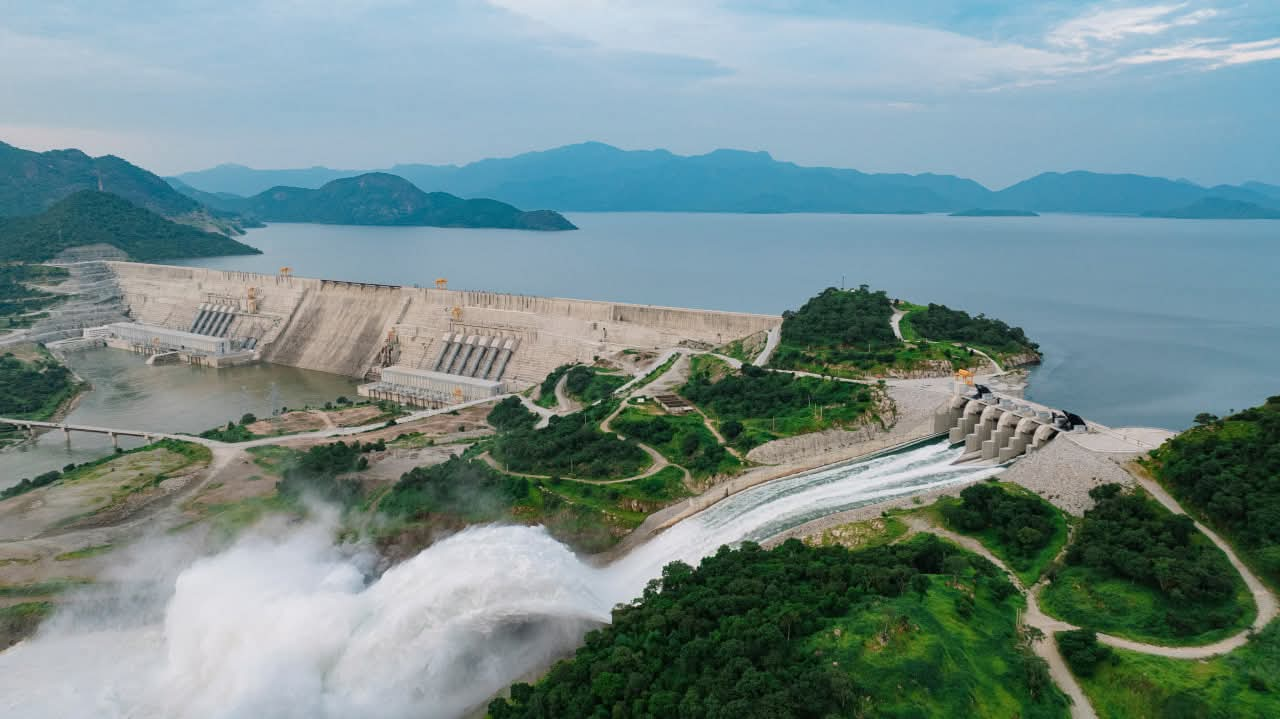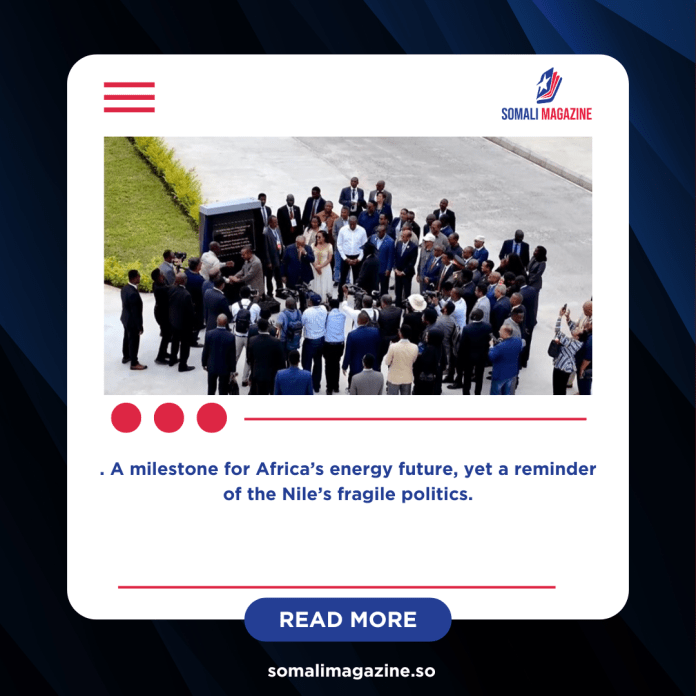Facebook Twitter (X) Instagram Somali Magazine - People's Magazine
Somali President Hassan Sheikh Mohamud joined Kenyan President William Ruto and Djiboutian President Ismaïl Omar Guelleh on Tuesday to witness the official inauguration of the Grand Ethiopian Renaissance Dam (GERD), a project that has become Africa’s largest hydroelectric power station. The ceremony took place at the massive dam site in Guba, along the Blue Nile, and was marked by a symbolic show as an Ethiopian fighter jet flew low above the mist rising from the dam’s towering 170-meter drop.
The GERD is a project that has been years in the making and represents one of Ethiopia’s most ambitious national goals. With a price tag of about $5 billion, the dam began partial operations in 2022 but has now officially reached its full power-generating capacity. At 5,150 megawatts, it ranks among the world’s 20 largest hydroelectric dams and is expected to provide electricity to millions of Ethiopians who currently live without reliable access to power. Ethiopian officials say the GERD will not only meet domestic energy demands but also allow the country to export electricity to neighbors, potentially transforming the region’s energy landscape.
For Somalia, the presence of President Mohamud and senior officials at the inauguration was more than just symbolic. It signaled a moment of warming ties with Ethiopia after months of strained relations. Despite ongoing political and security challenges in the Horn of Africa, Mohamud’s attendance was seen as a diplomatic step toward strengthening cooperation between Mogadishu and Addis Ababa. Regional observers noted that having three leaders—Somalia’s, Kenya’s, and Djibouti’s—attend the launch underlined the dam’s significance not just as an Ethiopian project but as one with wide-reaching implications for the region.
However, the GERD is not without controversy. For Ethiopia, it is a source of national pride and a path toward energy independence. For Egypt, the project represents a potential threat to survival. Egypt relies on the Nile River for about 90 percent of its fresh water, and Cairo has long feared that the dam will reduce water flow downstream, putting its people and agriculture at risk. Negotiations between Ethiopia, Egypt, and Sudan have been tense for years, with no permanent agreement reached on how the dam should be filled and operated.
On Monday, a day before the inauguration, Egypt’s Foreign Ministry spokesperson Tamim Khallaf reiterated his country’s concerns in comments to Reuters. He said that Egypt would continue to monitor developments closely and “exercise its right to take all the appropriate measures to defend and protect the interests of the Egyptian people.” His remarks reflected the depth of unease in Cairo, where officials view the GERD as a strategic threat despite Ethiopia’s repeated assurances that the dam will not significantly harm downstream nations.
The situation is further complicated by military and diplomatic dynamics in the region. Egypt is preparing to send troops to join the African Union’s peacekeeping mission in Somalia in the coming weeks, while Ethiopian forces are already part of that mission. This means the two countries, while deeply at odds over the Nile, will find themselves operating side by side in another theater of regional security. Analysts have warned that this overlapping presence could add to the political complexity, given the fragile relationships and competing national interests at play.
The inauguration of the GERD thus carries multiple layers of meaning. It is a historic achievement for Ethiopia, a milestone in Africa’s quest for sustainable energy, and a flashpoint in one of the continent’s most sensitive geopolitical disputes. For ordinary Ethiopians, the dam promises light in homes, power for industries, and a future less dependent on imported fuels. For neighboring countries, it offers the possibility of cheaper, renewable electricity. Yet for Egypt, it raises profound fears about water scarcity and the long-term security of its lifeline, the Nile.
As leaders celebrated at the dam site, the event underscored both the promise and the peril of such a grand project. It united regional leaders in a show of support but also highlighted divisions that remain unresolved. Whether the GERD will become a bridge toward cooperation or a source of conflict depends largely on the choices and compromises of the governments involved in the years ahead.

